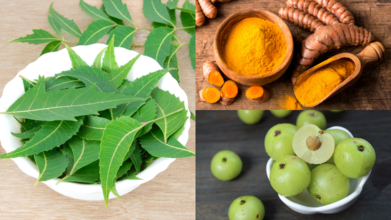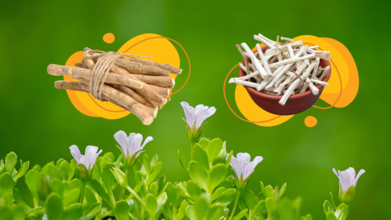- Health Conditions A-Z
- Health & Wellness
- Nutrition
- Fitness
- Health News
- Ayurveda
- Videos
- Medicine A-Z
- Parenting
- Web Stories
It’s Not Just Alcohol, Ayurveda Says Your Anger Might Be Damaging Your Liver

You’re eating clean, barely touch alcohol, and still feeling bloated, irritable, or constantly fatigued. Your liver panels are slightly off, but nothing seems to explain why. Now, what if the answer wasn’t in your plate or your glass—but in your pent-up rage or that unresolved tension you brush under the rug?
Ayurveda, the ancient Indian system of holistic medicine, has long warned us about something modern science is just beginning to catch up with—that your emotional landscape, particularly unchecked anger and stress, can be just as damaging to your liver as any toxin. Yes, your emotions might be silently inflaming your liver, disturbing digestion, and setting off a chain reaction that messes with everything from hormones to metabolism.
Anger isn’t just a fleeting emotion but a heat that fuels inflammation, stagnation and long-term organ dysfunction. Dr. Manoj Kutteri, Ayurvedic doctor and Naturopathy expert, reveals how our modern “go-go-go” lifestyle—laden with cortisol, quick fixes, and bottled-up emotions—throws our doshas off balance and overburdens the liver, the body’s chief detox organ.
When we think about liver damage, alcohol is often the usual suspect. While it's true that excessive alcohol consumption takes a significant toll on liver health, emerging insights from Ayurveda—the ancient Indian system of medicine—suggest there’s more to the story. Emotional factors like anger, stress, and anxiety may be silently impacting liver function too.
Dr. Kutteri emphasizes that the liver is not only a metabolic powerhouse but also a seat of emotion and energetic balance. “Whether it’s long-term anger, stress, alcohol consumption, or digestive issues, the root often leads us back to the liver—and more importantly, to our doshas and Agni,” he says.
The liver is one of the most vital organs in the body—second only to the heart and lungs. It performs over 500 essential functions including detoxification, digestion, hormone regulation, and energy metabolism. From filtering the blood to breaking down old red blood cells, the liver is constantly at work.
What’s often overlooked is that liver diseases are “silent” in their progression. Symptoms typically appear only when significant damage has occurred. This makes proactive liver care—not just reactive treatment—crucial.
Do Your Liver Reflect Your Emotions?
In Ayurveda, the liver is not merely a physical organ—it is energetically and emotionally linked to overall well-being. It's considered the seat of Pitta dosha, the dosha associated with heat, transformation, and metabolism. Dr. Kutteri explains, “Pitta governs digestion and blood quality. When it gets imbalanced due to anger, alcohol, spicy food, or stress, the liver is the first to suffer.”
This view helps explain why some individuals with minimal alcohol exposure still develop liver dysfunction. Their inner emotional and metabolic environment may be fuelling silent inflammation.
Effect of Tri-Dosha on Liver Health
Ayurveda recognizes three primary forces—Vata, Pitta, and Kapha—known as doshas. Each governs different bodily and emotional functions. When imbalanced, these doshas can impair liver health in distinct ways:
Pitta imbalance: Leads to excessive heat, inflammation, bile disruption, and can exacerbate emotional outbursts like anger.
Kapha imbalance: Causes sluggish metabolism, fatty deposits in the liver, and toxin accumulation.
Vata imbalance: Disrupts circulation and nervous system communication, resulting in erratic digestion and poor detoxification.
According to Dr. Kutteri, “A disturbed doshic balance doesn’t just reflect in liver enzymes or fat buildup. It shows up as mood swings, sugar cravings, skin breakouts, fatigue—subtle signs your liver is crying for help.”
How Anger Contributes to Diseases?
Western medicine is increasingly acknowledging the gut-brain-liver axis. Ayurveda, thousands of years ago, already made the link between emotions and liver health. Anger, in particular, is seen as a potent disruptor.
“Chronic anger or suppressed frustration creates heat in the body and disturbs bile flow,” says Dr. Kutteri. This not only upsets digestion but also leads to inflammatory responses—fueling gut issues, skin conditions, and metabolic imbalances.
In practical terms, if you’re someone who gets easily irritated, holds grudges, or experiences frequent emotional burnout, your liver may be silently bearing the burden.
What Ayurveda Says About Alcohol?
Yes, alcohol is still a villain—but Ayurveda explains why it affects people differently. For those with Pitta dominance, alcohol intensifies inner heat, disrupts digestion, and congests the liver. Kapha types may experience fat buildup and sluggish detoxification, while Vata types can suffer from dryness, anxiety, and erratic metabolism with long-term use.
“Ayurveda doesn’t just say avoid alcohol—it teaches you how your body constitution interacts with it,” says Dr. Kutteri.
Role of Agni in Digestive Fire
A central concept in Ayurveda is Agni, or digestive fire. When Agni is strong, the liver thrives. When weak, it leads to Ama (toxins), which accumulate in the liver and bloodstream. There are four types of Agni:
Sama Agni – Balanced digestion, indicating optimal liver health
Vishama Agni – Irregular digestion, seen in Vata imbalance
Tikshna Agni – Overactive digestion, associated with Pitta dominance
Manda Agni – Sluggish digestion, common in Kapha types
To maintain liver health, it’s essential to support Agni through mindful eating, herbal detox therapies, seasonal routines, and balanced emotions.
In Ayurveda, practices like pranayama (breathing), yoga, meditation, chanting, journaling, and chakra healing are not optional—they’re essential. These rituals help balance the doshas, release suppressed emotions, and support liver regeneration.
“In a world driven by productivity, we’ve ignored how emotional stress silently disrupts our organs. The liver is particularly vulnerable,” Dr. Kutteri stresses.
If your goal is to prevent chronic diseases like insulin resistance, diabetes, PCOS, or cardiovascular conditions—or even if you just want clearer skin, better sleep, and a calmer mind—start with your liver. It’s not just alcohol that burdens this mighty organ. Your anger, stress, lifestyle habits, and even your thought patterns play a role. Fortunately, Ayurveda offers us a holistic, practical, and deeply intuitive roadmap to heal from within.
So the next time you clench your jaw in traffic or hold back that outburst at work, remember: your liver might be absorbing more than just your diet—it’s absorbing your emotional leftovers too.
Dr. Manoj Kutteri is a wellness expert with specialization in Naturopathy, Ayurveda, Nutrition, Acupuncture, Yoga and Physical culture at the Atmantan Wellness Centre in India
Clear Skin in the Monsoon: 5 Ayurvedic Superfoods to Beat Breakouts from Within

Credits: Canva
The monsoon brings with it that dreamy smell of rain-soaked earth, endless chai cravings, and… surprise guests in the form of clogged pores, excess oil, and stubborn breakouts. Humidity and temperature swings are basically a free buffet for acne-causing bacteria. Most of us immediately reach for new face washes or a stronger toner, but according to Ayurveda, you might be missing the most important step, fixing what is on your plate.
“Seasonal changes can aggravate doshas, especially Vata and Pitta during the monsoon, leading to inflammation, acne, and rashes,” says Ayurveda practitioner Dr Madhumitha Krishnan. “Along with skincare, it is essential to bring balance through diet by choosing foods that are sweet in nature and slightly oily, which soothe the body and keep skin issues at bay.”
Here are her top five Ayurvedic superfoods that do more than taste good; they keep your skin glowing even when the weather is a mess.
1. Almonds
If almonds could talk, they would probably brag about how well they can multitask. Primarily sweet in taste and slightly oily in nature, they help balance both Vata and Pitta doshas, making them perfect rainy-season companions. Ancient Ayurveda, Siddha, and Unani texts all sing praises for almonds’ skin-enhancing abilities.
“They nourish the skin from within and maintain dosha balance during humid months,” explains Dr Krishnan. The trick? Soak them overnight. This makes them easier to digest and allows their nutrients to work deeper magic on your skin, keeping it supple and radiant.
2. Turmeric
This golden spice is not just for your grandma’s curries; it is basically edible skincare. Known for its antibacterial and anti-inflammatory powers, turmeric supports digestion (which in Ayurveda is key to skin health) and balances Vata dosha.
By slipping turmeric into your daily cooking, you help reduce the inflammation that often fuels acne. “It purifies the blood, wards off infections, and leaves the skin healthier from the inside out,” says Dr Krishnan. Think of it as the quiet hero who works behind the scenes, preventing those surprise breakouts.
3. Amla
Indian gooseberry, or amla, might be tiny, but it is a tridosha balancer with big skin benefits. It boosts immunity, slows down skin ageing, and helps detoxify the body, all of which lower your risk of monsoon breakouts.
“Amla is one of Ayurveda’s most powerful rejuvenators,” says Dr Krishnan. “Its detoxifying action removes impurities that would otherwise show up on the skin.” Whether you have it as juice, powder, or simply raw with a pinch of salt, your skin will thank you.
4. Neem
If breakouts are the troublemakers at the club, neem is the bouncer at the door. Its antibacterial, antifungal, and blood-purifying properties make it one of the most reliable Ayurvedic remedies for clear skin.
“Neem works by flushing toxins from the bloodstream,” explains Dr Krishnan. Neem juice might not win any taste awards, but it’s a small price to pay for skin that stays calm through the muggy season.
5. Garlic
Garlic might not win you any points in the “fresh breath” department, but it is a skin-saving legend. With its Vata-balancing qualities, it fights inflammation from within and supports overall detox.
Dr Krishnan says, “Many wellness experts recommend eating one raw clove of garlic on an empty stomach; it is a potent way to keep skin and overall health in check.” This practice has even gone viral on social media, proving that sometimes ancient remedies can become modern trends.
If you want to win the clear-skin game this monsoon, do not just attack the surface problem. As Ayurveda reminds us, beauty begins from within, quite literally. By adding almonds, turmeric, amla, neem, and garlic to your diet, you’re not just treating your taste buds; you are giving your skin an internal spa treatment.
Ashwagandha, Brahmi, Shatavari: Ayurvedic Trinity Every Woman In Her 20s Must Know

Credits: Health and me
Your 20s are usually described as the age of opportunity with new careers, new friendships, and the thrill of self-sufficiency. But behind that shiny veneer is a harsh reality most women manage to endure- mental pressure, unstable hormones, and the ever-present pressure to perform and present well. Throw in social media comparisons, irregular sleep, take-out lunches, and the occasional missed workout, and the body begins to trade on.
For most women, these are the years when they experience menstrual disturbances, mood swings, or initial signs of diseases like PCOD, thyroid disorders, or chronic fatigue. Conventional medicine prescribes treatments, but these are usually aimed at symptoms, not causes. Ayurveda, the traditional Indian system of medicine, addresses in a different manner - the balance of mind, body, and spirit before disease arises.
Three herbs, more than any others, have been proven over time in this tradition: Ashwagandha, Brahmi, and Shatavari. Used properly, this combination can assist women through the physical and emotional rollercoaster of their 20s with greater energy, clarity, and strength.
Brahmi for Stress and Mental Clarity
For most women in their 20s, stress is an inevitable friend. It tends to manifest as racing thoughts at night, difficulty concentrating throughout the day, or a nagging sensation of being "on edge." Brahmi, a traditional Ayurvedic adaptogenic herb, has been employed for centuries to calm the nervous system and clarify the mind.
Dr. Sane elucidates, "Brahmi balances the nervous system, calms anxiety, and enhances mental function. Its tranquility effect not only relieves tension but also aids in memory and concentration.
The science is aligned with tradition. Current research indicates Brahmi promotes neurotransmitter action, helping to improve mood management. For a woman balancing deadlines, social commitments, and individual aspirations, this translates into fewer mental whiplashes and smoother emotional steadiness. Ongoing use can make a subtle yet significant difference—converting fragmented attention into sustained focus and shattering mental fatigue with lucidity.
In contrast to speedy fixes such as caffeine, which provide temporary surges of energy with subsequent crashes, Brahmi's effects escalate over time. It doesn't render you drowsy it calms the mental static so you can think clearly about what's important without being wired or depleted.
Ashwagandha for Strength, Hormones, and Fertility
If Brahmi soothes the mind, Ashwagandha energizes the body. Dubbed the "king of herbs," Ashwagandha is renowned for its energizing properties. Its adaptogenic properties make it assist the body in adapting to physical and emotional stress.
Ashwagandha tones muscles, lowers fatigue, and increases energy levels," states Dr. Sane. "It's especially needed by women in their 20s, who tend to overlook their physical health in the process of keeping up with their hectic schedules.
But Ashwagandha's utility doesn't stop there. It's seriously associated with reproductive health, not just for stamina, but also for nourishing the ovum and hormonal balance. In women who have irregular cycles, menstrual cramps, or initial signs of hormonal imbalance, Ashwagandha provides a natural means of rebalancing. Science also suggests its value in maintaining healthy fertility, and thus it makes a great long-term reproductive health ally.
Shatavari for Hormonal and Vascular Health
Where Ashwagandha brings strength and Brahmi brings tranquility, Shatavari sustains. This herb is commonly referred to as the "queen of herbs" of female health. It's especially helpful for the reproductive system, assisting in regular menstrual cycles and relieving cramping periods.
"Shatavari is a hormone balancer and maintains healthy blood vessels, de-inflammating wherever stress and hormonal shifts usually inflame," Dr. Sane adds. Its rejuvenating action also includes immune system support so that the body's defense mechanisms are up and functioning.
The advantages of Shatavari radiate outward. Improved hormonal well-being tends to mean healthier-looking skin, steadier moods, and greater energy—effects of particular significance during the socially and professionally demanding 20s.
Why This Ayurvedic Trio is Best Combined?
Individually, each of these herbs is remarkable. Dr. Sane advises starting slowly: "A daily supplement, herbal tea, or even powdered form added to warm milk or smoothies can make a difference over time." Combined, they create a synergistic system of support:
Brahmi soothes the mind and increases focus, calming stress-related hormonal imbalances.
Ashwagandha builds the body, stabilizes stress response, and enhances reproductive energy.
Shatavari supports hormonal well-being, guards the vascular system, and preserves reproductive vigor.
This multi-faceted strategy tackles the entire range of females' troubles in their 20s — from the mental burden to physical endurance to long-term hormonal equilibrium.
Safe Use and Real Tips
Though these herbs are natural, they're not a one-size-fits-all remedy. Dosage and preparation come into play. In Ayurveda, herbs are frequently ingested as a powder with warm milk or water, or as capsules for convenience. General advice:
- Use high-quality, certified herbal supplements to ensure purity.
- If pregnant, breastfeeding, or on medication, seek guidance from a qualified healthcare practitioner before beginning.
- Herbs are most effective when used with balanced diet, regular exercise, and proper rest.
Ayurveda understands herbs in terms of a larger context. For women aged 20, combining these remedies with conscious eating, daily yoga or weight training, and electronic downtime can enhance effects.
Easy habits such as beginning the day with a quick meditation, consuming fresh seasonal produce, and maintaining an even sleep schedule can increase the impact of Brahmi, Ashwagandha, and Shatavari.
Your 20s aren't merely about bracing yourself against deadlines or pursuing milestones—they're about developing resilience, both physically and emotionally. "Consider this decade as your investing years for your future health," Dr. Sane suggests. "What you do now will determine how you feel in your 30s, 40s, and so on."
They're not wonder pills, but resources to assist you in getting through the demands of this decade without giving up your well-being. Amidst a society that celebrates hyperwork and perfectionism, electing to look after your mind and body is a gentle form of rebellion — and an investment in your healthiest future.
Dr Rohit Sane is ayurvedic doctor and CEO & MD at Madhavbaug, India
Eat Your Way to Lush Locks: 4 Ayurvedic Food Groups That Boost Hair Growth

If your hairbrush has been collecting more strands than you would like to admit, your plate might be the problem. According to Ayurvedic health coach Dimple Jangda, the secret to thicker, shinier, stronger locks doesn’t lie in a pricey serum but in your kitchen. “Four food groups… prevent hair loss and promote hair growth. You must definitely have this at home,” she says. And she’s not talking about exotic, hard-to-pronounce superfoods; these are humble, accessible ingredients that can transform your hair from limp to lush.
1. Greens
Dimple champions greens like spinach and moringa as hair saviours. Spinach is more than a side salad staple — it’s loaded with iron, folate, vitamin A and vitamin C. Moringa, often called the ‘drumstick tree’, is an Ayurvedic darling packed with vitamins A, B, and E, zinc and iron.
“Both of them help in stimulating hair growth,” says Dimple, explaining that they also boost the production of hair sebum, the scalp’s natural oil that keeps hair hydrated and protected. In other words, leafy greens are basically your hair’s in-house moisturiser.
Tip: Add spinach to your morning smoothie or sauté moringa leaves with a dash of ghee for a side dish that doubles as a beauty treatment.
2. Seeds
Next on Dimple’s list are seeds. Pumpkin seeds deliver zinc and other fatty acids, while flax seeds are famous for their omega-3 content. They help in improving the hair strength and reducing hair loss and hair breakage, according to Dimple.
Sprinkle a spoonful of flax seeds over yoghurt, blend them into your smoothie, or toss pumpkin seeds into your salad for an easy hair boost.
3. Vitamin C-Rich Foods
When Dimple talks about vitamin C, she’s not thinking about orange juice alone. She recommends sweet peppers and amla (Indian gooseberry) as top picks. Both are rich in vitamin C, which she says helps in reducing oxidative stress in your body, stimulating hair growth.
Oxidative stress is like rust for your cells and yes, that includes your hair follicles. Keeping it at bay ensures healthier growth and less shedding.
Tip: Snack on sweet pepper slices with hummus or chew on fresh amla if you can handle its tangy punch. You could also sip amla juice in the morning for a daily hair tonic.
4. Rosemary
Finally, Dimple calls rosemary the most powerful of the four. It contains rosmarinic acid, which she says can be consumed or applied. “You can make a rosemary tea and drink every day or you can make a concoction of rosemary, castor and coconut oil, apply it on your scalp and rinse it off after an hour,” she explains. This helps stimulate new hair growth and may even prevent baldness.
Making rosemary tea feels like a mini self-care ritual. The steam alone is soothing. As for the oil blend, it’s basically a spa treatment for your scalp.
Beyond the Plate
While these four food groups can work wonders from the inside, Dimple reminds us that holistic care makes the magic happen. Staying hydrated, avoiding excess caffeine, and massaging your scalp with oils infused with bhringraj, brahmi or coconut can further boost blood circulation and strengthen follicles.
Herbal masks made with hibiscus, fenugreek and shikakai soothe the scalp and encourage fresh growth, while daily stress-relief practices like pranayama, gentle yoga and mindful eating can help you keep your mane in peak condition.
© 2024 Bennett, Coleman & Company Limited

